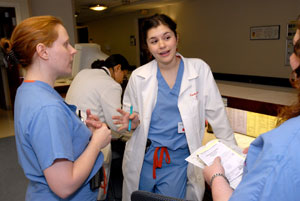Medical Errors Reduced By 30% When Doctors Required To Speak To One Another At Shift Change
 I have spent many blog hours bemoaning the inadequate communication going on in hospitals today. Thanks to authors of a new study published in the New England Journal of Medicine, I have more objective data for my ranting. A prospective intervention study conducted at 9 academic children’s hospitals (and involving 10,740 patients over 18 months) revealed that requiring resident physicians to adopt a formal “hand off” process at shift change resulted in a 30% reduction of medical errors.
I have spent many blog hours bemoaning the inadequate communication going on in hospitals today. Thanks to authors of a new study published in the New England Journal of Medicine, I have more objective data for my ranting. A prospective intervention study conducted at 9 academic children’s hospitals (and involving 10,740 patients over 18 months) revealed that requiring resident physicians to adopt a formal “hand off” process at shift change resulted in a 30% reduction of medical errors.
What was the intervention exactly? Details are available via mail order from the folks at Boston Children’s Hospital. It may take me a few weeks to get my hands on the curriculum (which was supported by a grant from the Department of Health and Human Services). I’m not sure how complex the new handoff initiative is in practice (or if it’s something that could be replicated without government-approved formality) but one thing is certain: disciplined physician communication saves lives.
I myself (without a grant from HHS or a NEJM study to back my assertions – ahem) proposed a set of comprehensive communication practices that can help to reduce medical errors in the hospital. My list involves more than peer hand-offs, but also nursing communication, EMR documentation strategies, and reliance on pharmacists for medication reconciliation and review. It is more than just an information exchange protocol for shift-changes, it is a lifestyle choice.
I applaud the I-PASS Handoff Study for its rigorous, evidence-based approach to implementing communication interventions among pediatric residents in children’s hospitals. I am stunned by how effective this one intervention has been – but a part of me is saddened that we practically had to mandate the obvious before it got done. What will it take for physicians to adopt safer communications strategies for inpatient care? I’m guessing that for many of us, it will involve enrollment in a workshop with hospital administration-driven requirements for participation.
For others of us – regular communication with staff, patients, and peers already defines our medical practice. But because (apparently?) we are not in the majority, we’ll just carry on our instinctual carefulness and wait for the rest to catch up. At least now we know that there is a path forward regarding improving communication skills and transfer of patient information. If we have to force doctors to look up from their iPhones and sit around a table and speak to one another – then so be it. The process may improve our lives while it saves those of our patients.










